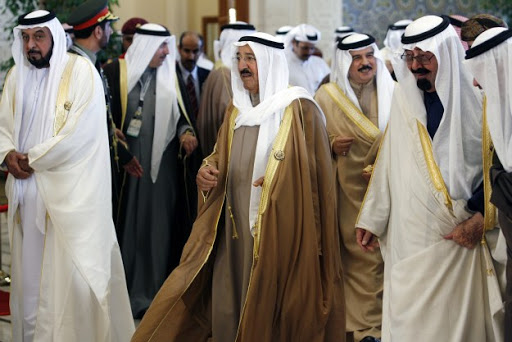Islamic Awakening: Puppet Persian Gulf monarchies unlikely to survive wave of revolutions

 A prominent Washington-based analyst tells Press TV that the archaic Wahhabi Saudi regime is unlikely to survive the wave of the pro-democracy uprising by its people in 2013.
A prominent Washington-based analyst tells Press TV that the archaic Wahhabi Saudi regime is unlikely to survive the wave of the pro-democracy uprising by its people in 2013.
The comments come as reports suggest that the Saudi Monarch Abdullah bin Abdul Aziz has slipped into a coma and is clinically dead. The 89-year-old king’s health has declined over the past few years, and he has been hospitalized several times. In the meantime protesters in Saudi Arabia have once again held a demonstration against the Al Saud regime in the country’s oil-rich Eastern Province.
Press TV has talked with Ali Al Ahmed to shed more light on the issue at hand. He is joined by two additional guests on Press TV’s News Analysis program: Fouad Ibrahim, author of Shiites of Saudi Arabia from the Lebanese capital city of Beirut and Chris Bambery, author and Middle East expert from London. What follows is an approximate transcription of the interview.
Press TV: Is Saudi Arabia going to face a succession crisis if anything happens to the king?
Ahmed: Well, I really do not see a succession now if the crown prince passes away before the king that is certainly a secession crisis there. Let us remember that the United States has made sure and has spent a lot of time and effort to make sure that a crisis does not emerge. As long as the king of Saudi Arabia is in his place for the next, maybe, year or so I do not think that we will see a lot of tensions but if he lives longer than that, obviously he is incapacitated that he cannot govern directly, he is very old, he cannot enforce his orders, we will see growing tensions among the younger Al Saud and we have already seen that but I would not see an immediate crisis for succession in that country.
Press TV: Mt. Ahmed do you think that these protests are going to spread? I mean our guest in Beirut [Fouad Ibrahim] is saying that they have happened in Riyadh, now on Jeddah, earlier we had reports in Medina and it is just not about the Qatif or eastern provinces; now we are hearing of the Hejazi tribes, the Zeidi or Esmaeeli tribes getting involved as well. So do you think that this is going to get bigger?
Ahmed: I think so. In fact I believe that 2012 was the preparation year meaning that the protests continued in the east and spread across the country but in 2013 we will an explosion of protests, because people have seen how effective the protest movemnet in the past few weeks for example shedding light on some political prisoners though Tweeter and through some limited protests in the center of the country, the government submitted to the will of the people, released some of the famous prisoners like Yousuf al-Ahmad and Suleiman Alwan and –Helal al-Ghasir–, whom the government called terrorists a few weeks ago.
t
So the people in that country realized that they have power in their hands, which is power to protest and power to take to the streets and I think that 2013 will really become the best year for the process (protests) in Saudi Arabia and we will see the faces in Washington shocked at the level and velocity of the protests, given the fact that there is work been done to make sure these protests continue and as a person involved in this effort that we will see a massive amount of protests across every city, basically, in every region in that country.
Press TV: Do you think, basically, that the role that Saudi Arabia is playing in the region is aimed at stopping its own people from imitating the popular uprisings in the region or what interests are involved?
Ahmed:
Yes, absolutely. The monarchy of Saudi Arabia and the Persian Gulf [monarchies] are extremely worried that their demise is near and they are doing everything, spending the majority of the country’s wealth on defending themselves either through bribing the West, signing these massive deals, weapons deals, to [with] the United States and the United Kingdom and spending money to increase the size of the military and the security and trying to undermine revolutions in Bahrain by invading, and in Yemen by supporting the regime, in Egypt and other countries, so because they are very selfish they want to survive and they are willing to do anything and everything to stop their demise, so I think they will fall at the end because you cannot really change the course of history, no government, the United States cannot do it; the course of history is that the regimes in the Persian Gulf, not only Saudi Arabia, the monarchies are not sustainable and this time and age the people of those countries of the world, anywhere, cannot accept a regime that belongs to the Middle Ages and it will go away eventually. 2013 will be a pivotal year just, I think, neighboring countries should assist the people of Saudi Arabia to make this faster, to make that regime [of Al Saud] go away.
Press TV: Mr. Ahmed under a minute if you can tell us, do you think Washington is deliberately giving support to the Wahhabi ideology?
Ahmed: I think the US government strategically prefers to have extremists running the show in the Persian Gulf, in the region in general, because it serves their policies, that is why they supported the most extreme regimes in Saudi Arabia and in Bahrain and Qatar and other Persian Gulf countries.
Sane, rational, modern regimes are not the preference for [in] the United States policy.







